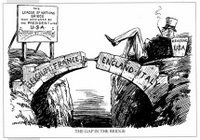The issue of abortion, while never anything like as vociferously contested in Europe as it is on the other side of the Atlantic, nonethless does raise its head from time to time. Zoe Williams has an
extremely provocative opinion piece in today's
Guardian, written to mark the 39th anniversary of abortion being legalised in Britain, and against what the author sees as an increasingly deceitful and hypocritical tenor to the debate in the UK, both in Parliament and in the public at large.
The polemics of the piece are striking. The abstract begins by bemoaning the fact that, even for the left, abortion is now viewed as a "necessary evil", allowing pro-lifers to "dominate the debate" and putting "women's hard-won rights under threat". Williams recalls her own experience, first with abortion and then with writing about it, in the mid-90s. Then, as now, she railed against the fact that it was, although legal, nonetheless viewed as something taboo: why, for example, are there nop jokes about it? We have jokes about everything else, from cancer to physical and mental handicap; but, she insists, "in comedy, even in very mainstream comedy, there are almost no taboos" however, "you could make a joke about September 11 before you could make a joke about abortion". And this at a time when a quarter of all women have had abortions, then it is something thqat must affect all of our lives: "Seriously, unless you are very cloistered or you are incredibly judgmental and uptight and nobody ever tells you anything, you will have been aware of an abortion at very close quarters, even if it was not your own".
I pause at this point to flag one or two concerns about the facts of her polemic. Firstly, something anecdotal; I view myself (perhaps, of course, mistakenly) as neither cloistered nor uptight and judgmental, and yet abortion has not yet affected me at close quarters. Of course, I may well be simply an unlikely exception; however, Williams' rhetorical use of the blunt 25% statistic in this manner seems a little at odds with her insistence, towards the end of the article, on the social/ class elements of abortion availability and uptake. Further, I am simply not convinced that it is true that mainstream comedy has an abortion taboo to a degree greater than, for example, September 11th: I have seen abortion jokes, for example, in recent episodes of both
South Park and
Family Guy; and both are American series, although admittedly known for pushing back the boundaries.
These are not important points, but they do provide us with a hint that things are not quite as straightforward, not quite as black and white, as the author presents them; and it is this that, to my mind, constitutes the most serious failing of the piece: it's insistence on framing the abortion debate within a series of strict dichotomies (open/taboo; honest/hypocritical; banal/murderous), and its outright rejection of any possibility for complex and nuanced positions that simply reject that the ethics of the issue can be reduced to a set of "either/or" extremes. Consider, for example, the following passages:
Why are there never any abortion jokes? Why is it unthinkable to discuss it without prefacing everything with "of course, it's terribly traumatic, no woman enters into this lightly"? I found it no more traumatic than any other operation I have ever had, no more psychologically scarring, way less painful than anything involving my teeth and considerably less annoying than anything I have had done on the NHS...
Even writing that, I am furious - it is considered a given, an unarguable tenet of modern society, that you would feel ashamed of having a termination, that you would, in some cutesy, feminine, inarticulate way, feel "bad" about it. You are not allowed to talk about this operation unless it is to say how dirty it made you feel. We are all expected to have these moral objections and yet suffer the business anyway, in the name of pragmatism. Ethically, this is a far dodgier and more repugnant position than mine, which is that I am entirely pro-abortion because I do not consider it murder; if you do not consider this foetus human, then it becomes no more of an issue than getting a tumour removed.These passages illustrate perfectly, to my mind, the deeply reductive and impoverished manner in which Williams thinks and writes about the issue of abortion. There can be no middle ground which is not hypocritical: either abortion
is murder, in which case we must surely ban it all; or it is
not,
in which case it should be viewed in much the same way as having any unwanted body removed by medical procedure. There is quite simply no room here for the position that I, and I suspect many others, hold: that it is an absolute violation, indeed a form of bondage, to force women to do with their own bodies that which they do not want; but that,
at one and the same time, a foetus is an entity that can command both respect and sympthy; not, perhaps, as a human in its own right, but out of understanding of and hope for the life that it has the potential to become. Williams would have us believe that one cannot feel sorrow for the loss of a foetus, for the loss of that potential life, without either being anti-abortion or thoroughly disingenious. The latter allegation is one, however, that I would level at her: her attempts to polarise through reductive polemic are not an accurate representation of the debate, and are undertaken in order to browbeat her target audience (the rights-conscious "left") into agreeing with her basic position: that having an abortion is no different from removing a tumor.
It would be remiss of me not to acknowledge a very major influence on my own thought in this regard. The American legal theorist and literary critic James Boyd White has looked at the issue of abortion from the perspective of his own understanding of the role of rhetoric in social life, and has bemoaned the reductive and dichotomous terms in which American public debate is held. Perhaps there are some (like Williams) who do experience the decision to abort in terms of one of the extremes that she thinks exhaust the field of honest debate: either it is without question murder, and unacceptable, or it is no different from a woman's decision to drink, smoke or wear makeup, and to be left entirely to her own preference; however, it is doubtful in the extreme whether this is how the majority of women who have an abortion experience it. White presents the distortions in the debate between right and left in the US on this issue in the following manner:
The "pro-life" position is often associated with those who favour capital punishment, for example, the "pro-choice" with those who on moral grounds oppose the infliction of the death penalty - and the ironies on both sides are instantly apparent. The "pro-life" position rests upon sympathetic identification with the unborn child but is often - with some honorable and compelling exceptions - associated as well with political positions that resist "welfare programmes" of the kind that might make these children's lives more endurable after they are born. The "pro-choice" side speaks of freedom to choose as though abortion were entirely unproblematic, like choosing some other consumer good, rather than the tragic decision it surely is for almost every woman who faces it. On both sides there is thus significant denial; if each side could admit just this much of what is problematic in its position one could imagine a conversation - unsatisfactory, no doubt - beginning to occur. (James Boyd White, Acts of Hope: Creating Authority in literature, Law and Politics (1994) p. 166-167.Williams article is a perfect example of how not to argue about abortion. There is absolutely no room for nuance or complexity of any kind in her position; still less for any acknowledgement of what might make it problematic to others. This brings us to a striking paradox in her piece: the only
rapprochement, the only understanding that she can reach is with those who are diametrically opposed to her; those in for whom abortion is murder, who campaign for a blanket ban. Only these groups are speaking her language; only they escape her charge of disingenuity and hypocrisy, and thus only they win her respect. It is only this blind commitment to the abstract extreme that leads her to invert White's point, and claim that abortion is only a tragic choice because of a creeping and covert criminalisation in political and public rhetoric, and not because the loss of a foetus, and the potential it embodies, can be mourned on terms other than those of the loss of human life. To take White again (whose work I really cannot recommend highly enough), "[i]n such terms as these no thought worthy of the name can proceed, and the vice is not merely intellectual but ethical and political as well, for neither formulation establishes a community in which difference is respected" (White, "What Can a Lawyer Learn from Literature?" 102
Harvard Law Review (1988-1989) 2014-2047, at p. 2046).
Williams article can thus provide us with absolutely no intellectual resources for understanding and explaining precisely why abortion
is a hard choice for most of those faced with it; instead, her polemic is geared towards forcing acceptance of the proposition that it is not
in fact a hard, or tragic, choice at all, but is only made to appear such by a dishonest political and public rhetoric designed by crypto-right wingers to make women feel ashamed to exercise their inalienable rights. Hers is not a contribution to a debate; it is a call to arms in an outdated battle that will, like most extremist wars, end up causing far more harm than it avoids for those it ostensibly seeks to champion.



